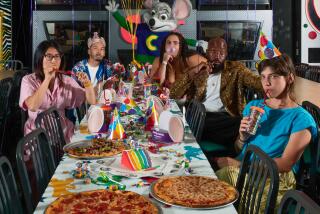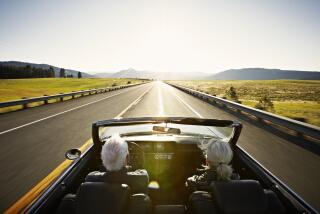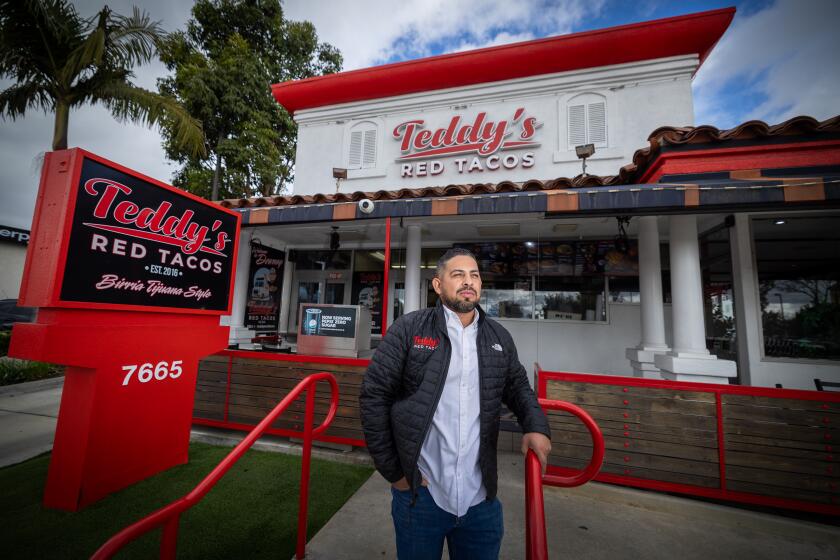Of a Certain Age : 21 was once a marker for adult indulgences. But tough times have squashed the party mood.
- Share via
Laurie Michaelson dared the bartender to ask for her ID.
When he demanded proof of age, she whipped out her driver’s license, beaming.
“Today I’m 21, and that means I can order anything I feel like,” she said.
The college junior surveyed a menu of the 30 drinks offered at Chiller’s Bar and Grill in Santa Monica and requested the slushy “Purple Orgasm” (grape punch and vodka). “I’ve never had one of those before,” she said, bursting into giggles before sipping her first legal drink of alcohol. “I’m having a blast.”
But a few days later, she was a little more philosophical. “Turning 21 is fun because you’re legal, but it really isn’t as big a change as I thought,” said Michaelson, a student at Emerson College in Boston. “I actually feel like I’ve been an adult for a long time. Sometimes I wonder what being 21 really means.”
Traditionally, it has meant out-of-control parties, crowded bars, eardrum-busting music, wild friends, kegs, kegs and more kegs. But experts expect many of the estimated 3.7 million Americans turning 21 this year to tone down--or forgo--a celebration.
Coping with the recession, unemployment, divorced parents and fear of AIDS have squashed the party mood. “Turning 21 is almost anti-climactic,” said Peter Benson, president of the Minneapolis-based Search Institute, a nonprofit group that studies adolescents and young adults. “There’s a sense of loss. They expect something to change when they turn 21. But not much does because society made them grow up faster. Then they realize they’ve been adults for a long time.”
By the time they turn 21, research shows that most people have had sex and experimented with alcohol--two events that many young people view as markers of adulthood.
A 1991 national study conducted by the Institute for Social Research at the University of Michigan found that 88% of the 12th-graders questioned had used alcohol at least once. Thirty years ago, less than half experimented with alcohol before graduating from high school, said Ruby Takanishi, executive director of the Carnegie Council on Adolescent Development in Washington. “It was considered really far out to drink before being legal,” she said, “so they used alcohol to celebrate their rite of passage into adulthood. But now, people who drink on their 21st birthday find it’s not really that exciting. It’s old.”
Before Ron Carmean turned 21 last June, he counted the days until he could get “messed up in a big way” at some bars near his home in Lawndale. “I thought, ‘Cool. I’m gonna be 21. Let’s party,’ ” said Carmean, who works in a photocopy store in Manhattan Beach.
“But now I can’t remember which time I was just at a bar and which time I was at a bar celebrating my 21st birthday. I mean, I had alcohol before and after I was 21, so it was kinda hard to keep track.”
“A lot of people have fake IDs, so they’ve already had the privilege of being 21 before they’re actually 21,” said the general manager of a Westside bar. “They might get drunk (at an earlier age) but a lot of them are acting more mature about it by designating a driver or making sure at least one person in their group doesn’t drink.”
Drunk-driving arrests in L.A. County have dropped over the last three years, according to Gordon Smith, an officer with the LAPD’s traffic coordination section. Arrest reports don’t specify age, but Smith said most people arrested are in their late 20s and 30s or 40s. Campaigns against drunk driving “have helped younger people take more responsibilities.”
Hana Abisaab of Los Angeles said she rented a hotel room on her 21st birthday so she and 20 friends could drink and not worry about the consequences. “I definitely got a room so my friends could stay over if they got too wasted,” said Abisaab. “If something bad had happened, it would’ve really ruined my 21st birthday. And I wanted it to be special because it’s suppose to be significant.”
Most people in other countries don’t consider 21 a milestone age, said Catherine Martin, an anthropology professor at Cal State L. A. “Different cultures have different ages of socially recognizing people as adults. Turning 21 is no longer a magical age because so many (people) in this country celebrate according to their culture’s traditions. It blurs the age of adulthood. And that’s too bad because people need some kind of marker to ease the transition into adulthood.”
Derek Durward heard all the stories about how turning 21 changes a person’s life. For his 21st birthday last May, the Rancho Palos Verdes resident said he wanted more time alone to ponder being an adult, but felt pressure to make a production out of turning 21.
“I was calm and everyone else was making a big deal out it,” said Durward, a junior majoring in communications at San Francisco State. “It was like I was screwing up if I didn’t have at least one drink on my 21st birthday. But I realized turning 21 didn’t matter much. I’ve been an adult for a long time.”
According to Kathleen Rawson, director of sales and marketing for Toppers restaurant in Santa Monica, “Celebrations for 21st birthdays have calmed down because it’s no longer a much-awaited event.”
And the parties are more formal, said Dave Lista, manager of Moose McGillycuddy’s in Long Beach, a college bar that attracts students from Cal State Long Beach. “It’s still big because they’re finally legal, but a lot of people are more mature about it.”
The more hype, the more disappointed people usually feel about their 21st birthdays, said 24-year-old Jane Rinzler, who does research on people in their early 20s for Converse shoes.
“This generation is looking for a traditional rite of passage and they’ve heard that it’s turning 21,” said Rinzler, who lives in Boston. “In reality, they know it’s no longer a big deal but they still try to hold onto the excitement and then feel let down when there isn’t much. Then they also get depressed thinking about what’s next. They’ve heard about the angst people feel when they turn 30, 40 and, God knows, 50. So they think everything after 21 is all downhill.”
Ashley Jacobs of Santa Monica was hoping her parents would mellow before her 21st birthday. “They’re already getting excited and planning a party,” said Jacobs, a UCLA junior majoring in environmental studies. “I hope they don’t feel too disappointed, but I think I just want to go out for a nice dinner with a few of my close friends.
“After all, turning 21 isn’t going to have a big effect on my life,” she said. “But I do think I’ll still order my first legal drink since the next milestone birthday is turning 30. And that doesn’t excite me at all.”
Michael Angelo said he was warned not to expect life-altering changes when he turned 21. Still, the Seattle resident couldn’t help but get excited when he considered being carded at a bar.
“Just the experience of sitting in a bar, ordering an alcoholic drink and being able to say, ‘Yes, I am 21. I’m legal,’ is reason enough to feel good and celebrate,” said Angelo, a USC senior majoring in journalism.
More to Read
Eat your way across L.A.
Get our weekly Tasting Notes newsletter for reviews, news and more.
You may occasionally receive promotional content from the Los Angeles Times.










